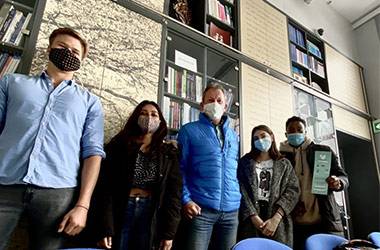Sustainability: Selling Coffee Cups from Recycled Coffee Grounds
Sustainability: Selling Coffee Cups from Recycled Coffee Grounds
Sustainability: Selling Coffee Cups from Recycled Coffee Grounds
https://www.wittenborg.eu/sustainability-selling-coffee-cups-recycled-coffee-grounds.htm
Wittenborg Students Help Apeldoorn Company Design a Marketing Plan
A group of students from Wittenborg University of Applied Sciences recently did a project on a local business from Apeldoorn, You Lucky Bird, which reduces waste by selling coffee cups made from re-cycled coffee grounds. The students drew up a marketing plan to help the company launch a new product line: making orange juice bottles from waste orange peels.
The international student group who did the research consists of Kyle Holtzhausen, Rongai Torongo, Inga Natchkepia, Cem Albala, Sohara Patabandige and Mulenga Shebani. It served as an exam assignment for the "Marketing Plan" module taught by lecturer Bob Dyson. "During this module the students had several meetings with the management of the company, including one (Corona proof) face-to-face meeting at Wittenborg, in which all members of the group were present either in person or via video link," Dyson said.
The company was founded by Paul Van der Hulst, who is already an expert in the coffee industry. The coffee cups they make is created from coffee waste. The main vision of the company is to present the world with a circular mindset - a circle that reduces organic waste and simultaneously supports people in underdeveloped countries.
"You Lucky Bird currently offers an excellent alternative to wasteful coffee cups," the Wittenborg group writes in their final report. "Most businesses with industrial coffee machines use single-use coffee cups. Takeaway coffee aside, the average office worker drinks approximately 1,000 cups of coffee annually. Although many of those coffees will be in a clay or glass cup, up to half could be from disposable cups, which is not sustainable.
"Not only is this important to engage in on a personal level, but looking at organisations as a whole, companies strive to be evermore eco-friendly and, if so, one of the many simple ways to do so is to reuse coffee cups with the added benefit of ethically contributing to the source of where the coffee product originally came from. You Lucky Bird does so by contributing a portion of its profits to education and a better standard of living in Ethiopia. The strength here is a powerful story that ethically enriches."
In terms of weaknesses, the report reads: "You Lucky Bird is the definition of an eco-conscious company, which is one of its biggest strengths, but the reason it is also a weakness is because it adds a few challenges to processes, such as transport. Ideally, no gas should be used at all, with a minimum carbon footprint, but on a B2B order of a few thousand cups it becomes very difficult to avoid a van or truck. At this point customers are given the choice of bicycle delivery or standard post which removes the responsibility of choice from the company but unfortunately sustainable transport solutions are few and far between and costly.
"Public backlash is a very fast disintegrator of some of the best intentions. Anything that might contradict the well-intended message of sustainability can result in the demise of the product or even company."
Aside from playing an important role in reducing waste material, another opportunity pointed out by the team is the fact that the company is Dutch and one of the advantages of the Netherland’s political landscape is its membership of the EU. "Due to this, the company has opportunities to easily export its products to other EU member countries, as the European Union has regulations with regards to free trade, travel and more. The only important consideration here is how to do so sustainably."
The new concept product of You Lucky Bird is a bottle structured by orange peel waste.
"The idea of creating a circular juice bottle made of orange peel waste is one with few risks and much promise. Not only is it unique in material and design but also involves good ethics and practicality. From a financial standpoint, initial investment is high because of dye cost and design processes, but for a supply based on demand product where demand already exists, the writers of this report suggest it is a feasible investment for You Lucky Bird.
"Increasingly more companies are using marketing storytelling in order to help customers learn more about a brand and its products. You Lucky Bird has an interesting story that can encourage customers to buy their products. The main goal of the company is to make the planet better instead of focusing on profit. In order to increase literacy levels in countries where the product originally comes from, You Lucky Bird is currently already financing the education of children in Ethiopia and other undeveloped countries. Moving forward with oranges, farms in South America, Africa and Asia are all potentially new projects to take on. The main goals and intentions of the company create a positive change not only for the consumer but on every level of the process. With this at its core, the brand image and company's story are the main points of marketing and attracting customers."
WUP 22/4/2021
by James Wittenborg
©WUAS Press
855 words